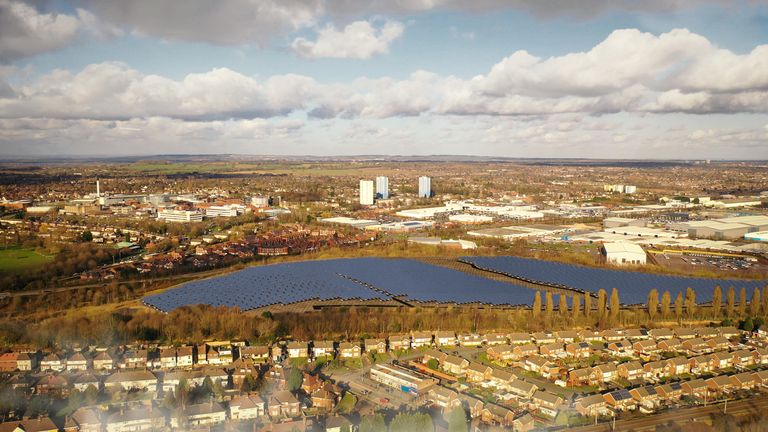An NHS hospital in the Midlands is planning to become the first in England to be fully powered by renewable energy.
Proposals for a giant solar farm have been approved in Wolverhampton. The site will be cabled directly to New Cross Hospital.
Hospital bosses believe the scheme will save the trust millions of pounds in energy bills in the coming years and plan to spend the money on frontline services instead.
Construction of the solar farm is due to begin this autumn, with completion as early as spring next year.
Planning images show solar panels stretched across a former landfill site the size of 21 football pitches.
The idea to turn the former tip into a solar farm began at the council in Wolverhampton.
“It’s toxic land, we can’t build on here, we’d never be able to do anything and we had some issues with fly tipping” says councillor Steve Evans.
“But one of the projects we’ve looked at is a solar farm so it’s something we very much wanted to do to supply clean energy. Sadly we just couldn’t get the funding streams.”
After making contact with the Royal Wolverhampton NHS Trust he discovered they were able to access funding. Working together, they drew up plans for the site.
It will link to Wolverhampton’s largest hospital via an underground cable, known as a private wire, stretching the half mile distance between the two sites.
Stew Watson, from the trust, describes the plan as “win-win” for the hospital.
“The huge benefit to the hospital is we will be able to power all of our electronic needs for the site from the solar farm.
“So we will move away from the grid – we will always have the grid as a back-up because of obviously the services we provide in healthcare – but we will look to harness the energy of the sun each year and use that to power the full hospital.
“In terms of the monetary side of things – this could generate savings of something in the order of £15-£20m over the next 20 years. That money will be pushed straight back to frontline in terms of healthcare.”
He hopes the wider health benefits will also help the NHS.
“By moving away from our reliance on fossil fuels to clean, green energy, we hope it will reduce the amount of parties needing healthcare treatment and the hospital in the longer term,” he says.
The hospital will be the first in England to be directly powered by a solar farm. Existing green energy sources already in use at the hospital, including harnessing heat from the waste incinerator, will provide additional power but it’s hoped the majority will come from solar.
Wolverhampton is among the majority of councils that have declared a climate emergency. The city has set a target to reach net zero by 2041.
The scheme is being seen as a model for other cities in the race to cut emissions.
Simon Roberts, the chief executive of the Centre for Sustainable Energy, said: “It sounds to me like the first time a hospital, a big public sector organisation, has managed to link up with a solar development, a renewable development, that’s not on their site and managed by doing so to underpin the financial viability of that project and enable it to go ahead.
Subscribe to ClimateCast on Spotify, Apple Podcasts, or Spreaker
“In this particular case such [it’s] a good use of otherwise very difficult land to use and something that will cut the hospital’s costs and cut their emissions quite significantly.
“It’s a very good example of how different organisations who maybe until now just had a relationship of paying the rates and getting the bins collected need to think differently about how they can join together to work in a shared purpose which is net zero.”


